Ten Para athletics world records under threat in 2017
07.02.2017With the athletics season starting to get underway, here are 10 world marks that could be toppled in the coming months.
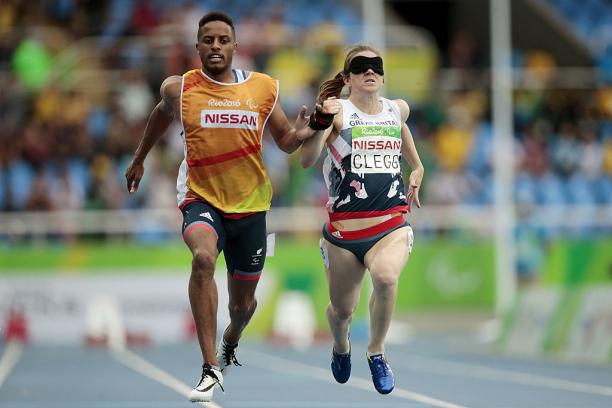 (L-R) Chris Clarke and Libby Clegg of Great Britain in action during the women's 100m - T11 Semifinals at the Olympic Stadium on Day 2 of the Rio 2016 Paralympic Games on September 9, 2016 in Rio de Janeiro, Brazil.
© • Getty Images
(L-R) Chris Clarke and Libby Clegg of Great Britain in action during the women's 100m - T11 Semifinals at the Olympic Stadium on Day 2 of the Rio 2016 Paralympic Games on September 9, 2016 in Rio de Janeiro, Brazil.
© • Getty Images
 Charl du Toit of South Africa celebrates winning the gold medal in the Men's 400m - T37 final on day 9 of the Rio 2016 Paralympic Games at the Olympic Stadium on September 16, 2016 in Rio de Janeiro, Brazil.
© • Getty Images
Charl du Toit of South Africa celebrates winning the gold medal in the Men's 400m - T37 final on day 9 of the Rio 2016 Paralympic Games at the Olympic Stadium on September 16, 2016 in Rio de Janeiro, Brazil.
© • Getty Images
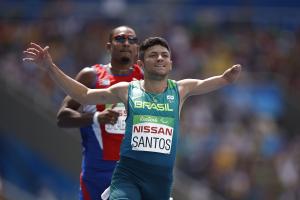 Petrucio Ferreira dos Santos - Rio 2016
© • Wagner Meier for the IPC
Petrucio Ferreira dos Santos - Rio 2016
© • Wagner Meier for the IPC
 Hannah Cockroft of Great Britain competes in the Women's 800m - T34
© • Getty Images
Hannah Cockroft of Great Britain competes in the Women's 800m - T34
© • Getty Images
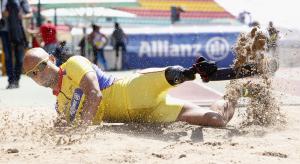 Japan's Atsushi Yamamoto competes in the long jump at the 2016 IPC Athletics Grand Prix in Berlin.
© • Getty Images
Japan's Atsushi Yamamoto competes in the long jump at the 2016 IPC Athletics Grand Prix in Berlin.
© • Getty Images
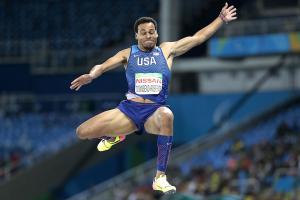 Roderick Townsend-Roberts of United States competes during the Men's Long Jump T47 final at Olympic Stadium on day 7 of the Rio 2016 Paralympic Games.
© • Getty Images
Roderick Townsend-Roberts of United States competes during the Men's Long Jump T47 final at Olympic Stadium on day 7 of the Rio 2016 Paralympic Games.
© • Getty Images
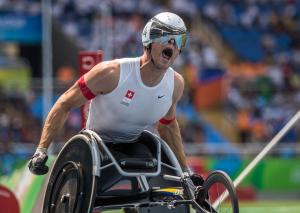 Swiss 'silver bullet' Marcel Hug finally got the gold he had been waiting for at Rio 2016.
© • OIS
Swiss 'silver bullet' Marcel Hug finally got the gold he had been waiting for at Rio 2016.
© • OIS
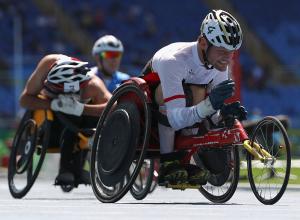 Peter Genyn of Belgium wins the Men's 100 meter T51 final at Olympic Stadium during day 6 of the Rio 2016 Paralympic Games on September 13, 2016 in Rio de Janeiro, Brazil.
© • Getty Images
Peter Genyn of Belgium wins the Men's 100 meter T51 final at Olympic Stadium during day 6 of the Rio 2016 Paralympic Games on September 13, 2016 in Rio de Janeiro, Brazil.
© • Getty Images
 Germany's Heinrich Popow giving an interview in the mixed zone at the 2016 IPC Athletics European Championships in Grosseto, Italy.
© • Marcus Hartmann
Germany's Heinrich Popow giving an interview in the mixed zone at the 2016 IPC Athletics European Championships in Grosseto, Italy.
© • Marcus Hartmann
More than 115 Para athletics world records were broken during 2016 and with a busy schedule of world class track and field action due to take place around the world in the months ahead, many more can be expected to fall.
With July’s World Para Athletics Championships in London, Great Britain, on the horizon, we take a look at 10 world records that could well be broken this year:
1.Women’s 100m T11 (11.91)
Great Britain’s Libby Clegg broke both the 100m and 200m T11 world records in 2016 and clinched double sprint gold at the Rio 2016 Games – all in her first season competing in the T11 class. With those experiences under her belt and even more time to adapt to running blindfolded with her guide Chris Clarke, the 26-year-old could go even faster this year.
2.Men’s 100m T37 (11.42)
South African sprinter Charl du Toit raced in to the record books in 2016, lowering the 100m T37 world record first in Nottwil, Switzerland in May and then at the Paralympic Games. If the 23-year-old continues where he left off then the 100m T37 mark could go even lower this year.
3.Men’s 100m T47 (10.57)
There was no stopping Brazilian sprinter Petruccio Ferreira at his home Games last year as he tore home to 100m gold, breaking a world record that had stood since 1992. In fact, he broke the previous record twice and saw off the likes of world champion Michal Derus of Poland as well as his countryman Yohannson Nascimento. The T47 sprints are bursting with talent and Ferreira, who is just 20-years-old, looks like he has plenty more to give.
4.Men’s 100m T51 (20.47)
For many years’ the stranglehold of Finnish racer Toni Piispanen, the T51 sprints took on an extra dimension last year as Belgian Peter Genyn took his rival’s Paralympic crown. Piispanen may be the current world record holder but if one man can improve on that mark, Genyn can.
5.Women’s 100m T34 (17.31)
British wheelchair racer Hannah Cockroft has made no secret of her desire to better her own 100m T34 word record, which has stood since May 2014. With the emergence of two young rivals in the USA’s Alexa Halko and fellow Briton Kare Adenegan, as well as the prospect of home crowd support this summer, the record could go.
6.Women’s 200m T44 (26.64)
Germany’s Irmgard Bensusan set the current world record in March 2015; she came tantalisingly close to lowering that mark at Rio 2016, clocking 26.70 in the first round of competition. With Frenchwoman Marie-Amelie le Fur showing great form and T43 track star Marlou van Rhijn regularly bettering her own world best, it is an event to watch out for.
7.Men’s 400m T38 (49.33)
Tunisia’s Mohamed Chida holds the current world record set at the 2011 World Championships in New Zealand, but if performances at Rio 2016 are anything to go by, that record surely can’t last long. South Africa’s Paralympic champion Dyan Buis led the world rankings last year clocking sub-50 seconds – a marked improvement on the global rankings from 2015. It’s a highly competitive class that looks to be getting even faster.
8.Men’s long jump T42 (6.77m)
The record was broken a remarkable five times last year, with three Para athletes making their mark. Japan’s Atsushi Yamamoto leapt 6.56m in May, then Denmark’s Daniel Wagner managed 6.67m a few weeks later before adding three centimetres more at the European Championships in June. Germany’s Heinrich Popow leapt 6.72m in July then 6.77m a month later. Surely it’s just a matter of time…but who will be next?
9.Men’s high jump T47 (2.12m)
The men’s high jump T47 final at Rio 2016 was one of the many memorable moments that captivated the crowds. US jumper Roderick Townsend-Roberts, the current world record holder, came tantalisingly close to improving his personal best and a clearance of over 2.12m looks well within his capabilities.
10.Men’s marathon T54 (1:20.14)
Swiss Paralympic champion Marcel Hug has stated his intention to target the world record mark this year and February’s Tokyo marathon – one of six major marathons Hug won in 2016 – could provide the perfect opportunity. The course has been changed for 2017 and is anticipated to be faster than ever before. The current record was set by Hug’s compatriot Heinz Frei in 1999.





















